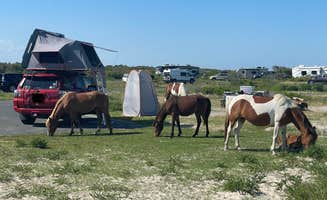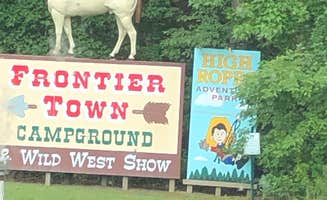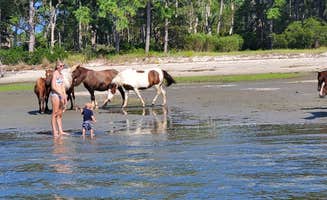Equestrian camping opportunities in Worcester County attract riders seeking direct beach access along Maryland's coastline. The area averages 45 inches of rainfall annually, creating lush grazing grounds for wild horses while maintaining sandy terrain suitable for trail riding. Camping with horses requires specific preparations including proper containment systems since many sites don't offer dedicated corrals.
What to do
Beach riding opportunities: At Assateague Island National Seashore Oceanside Campground, riders can explore 37 miles of shoreline trails. "Plenty of places to explore. Several trails to walk or bike. Be prepared for the bugs depending on the season," notes Tony P., who suggests, "Check out the awesome views on the bayside trails."
Kayaking with horses: Launch from the campgrounds to observe wild horses in their natural habitat. "My husband and son kayaked from the campground over to a lovely sand bar off of Assateague Island. They got within very close range of a herd of ponies grazing at low tide," reports Rita M. at Tom's Cove Park.
Off-season woodland trails: Winter offers bug-free riding at EA Vaughn Wildlife Management Area. "Lots of trails. Pretty busy with Hunters during the season," warns Wayne L., suggesting riders verify seasonal hunting schedules before planning trips.
What campers like
Wild horse encounters: Campers appreciate morning horse sightings from their sites. "A deer hung out by the campfire at night, and in the morning there were horse tracks all over the sight. We chose to stay in October with less people and less bugs," shares Jodi J. from Bayside Assateague Campground.
Diverse terrain: The combination of beach and woodland riding creates varied experiences. "What more can you get you have ocean on the right and calm water on the left you can choose what to do," explains Jonny D. at Tom's Cove Park, highlighting the advantage of having both environments available.
Winter camping benefits: Off-season visits reduce insect problems significantly. "We only stayed on Assateague for 1 night on our way down the east coast. We camped on the bayside which had a really pretty view of the marsh and large camp sites," mentions Deanna G., who enjoyed winter horse watching with fewer crowds.
What you should know
Horse behavior management: Wild horses can approach campsites looking for food. "As soon as any food would come into 'nose-shot,' they would start advancing on us. We waited over an hour for them to lose interest and move on to the next site," warns Wendy W., recommending storing anything with a scent in closed vehicles.
Insect preparations: Biting flies and mosquitoes present challenges in warmer months. "Love this place but be prepared for the bugs. Even enjoyed this in the winter," advises Michael W., suggesting cooler months provide more comfortable riding conditions.
Weather considerations: Strong coastal winds affect tent stability near the shoreline. "Prepare for wind," cautions Tori V. at Assateague Island National Seashore, adding "Check the weather a lot because the storms roll in quickly. The stars are night sky are gorgeous if it is clear."
Tips for camping with families
Horse education: Teach children proper wildlife distance protocols before arriving. "The wild ponies create a distinctive camping experience. The horses are smart and can open latches so do bring bungee cords, kayak straps, or ratchet straps to lock all of your food in cases or coolers," Tony P. recommends.
Alternative water activities: Consider kayaking as a family-friendly horse viewing option. "We took a ride over to the ocean camp sites and found some horses! Worth a stop just for the simplicity of it all!" shares Deanna G., highlighting how water activities provide different perspectives of the horses.
Playground access: Trap Pond State Park Campground offers a nearby alternative with fewer wild animal concerns. "If you have kiddos, try and get a site in Loop A – there is a nice and educational play area (plus a game I'd never heard of– Gaga ball)," suggests Lee D., noting family-friendly amenities within 30 miles of Snow Hill.
Tips from RVers
Campsite selection: When traveling with horses and RVs, look for level sites with adequate space. "Sites are fairly spacious and have an interesting semi-circle pull through layout so backing in not required. They are not level and have a sandy base so it took a bit of work to finally get the rig level, even with auto-levelers," shares Jim G. at Trap Pond State Park.
Food storage systems: RVers should secure all food items from wild horses. "The Ponies are giant trash pandas. They're smart and can open latches," Tony P. warns, suggesting using ratchet straps on coolers and storage containers to prevent unwanted equine visitors.
Water access points: Choose sites with water views for better horse observation opportunities. "We stayed at site 50, back-in with FHUs but were told since the park was fairly empty, we could take a golf cart and go choose a site. We declined as 50 was in the pines, but still had water view," recommends MickandKarla W. at Tall Pines / Chesapeake Bay KOA Holiday.





